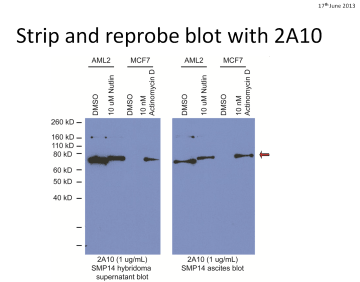Anti-MDM2 [SMP14]
Invented by David Lane from Karolinska Institutet
Invented at University of Dundee
- Datasheet
- References (16)
- Inventor Info
Info
| Catalogue Number | 151295 |
| Applications | ELISA IHC IF IP WB |
| Antigen/Gene or Protein Targets | Murine Double Minute 2 protein (MDM2) |
| Reactivity | Human |
| Relevance | MDM2 is over-expressed in many tumours. Its principal function is the ubiquitination and degradation of p53 tumour suppressor protein. |
| Host | Mouse |
| Immunogen | Synthetic peptide CSRPSTSSRRRAISE (residues 154-167 in human MDM2) cross-linked to KLH using glutaldehyde. |
| Positive Control | Breast carcinoma |
| Subclass Notes | Ig3 Kappa |
| Myeloma Used | P3X63Ag8.653 |
| Recommended Growing Conditions | DMEM + 5% FCS |
| Strain | Balb/c |
| Notes | SMP14 monoclonal antibody also recognises a peptide epitope around Thr-216 of murine MDM2 (when Thr-216 is unphosphorylated) see Zhang & Prives, 2001 for further details. SMP14 also cross reacts with some cytokeratins (6, 14 & 16). This is only a problem when working with certain epithelial cells and not fibroblasts. |
| Research Area | Adhesion, Cancer, Cell Cycle, Epigenetics & Nuclear Signalling |
References: 16 entries
Tao et al. 2013. Cell Res. 23(5):620-34. PMID: 23357851.
WB
Jiang et al. 2013. Nature. 493(7434):689-93. PMID: 23334421.
WB
Def defines a conserved nucleolar pathway that leads p53 to proteasome-independent degradation.
Europe PMC ID: 23357851
Reciprocal regulation of p53 and malic enzymes modulates metabolism and senescence.
Europe PMC ID: 23334421
Das et al. 2007. Int J Surg Pathol. 15(4):335-45. PMID: 17913939.
p53 and mdm2 expression in colorectal carcinoma: a correlative analysis with clinical staging and histological parameters.
Europe PMC ID: 17913939
Hashemi et al. 2002. Cancer Lett. 180(2):211-21. PMID: 12175554.
IF
A melanoma-predisposing germline CDKN2A mutation with functional significance for both p16 and p14ARF.
Europe PMC ID: 12175554
Zhang et al. 2001. J Biol Chem. 276(32):29702-10. PMID: 11359766.
ELISA WB
Cyclin a-CDK phosphorylation regulates MDM2 protein interactions.
Europe PMC ID: 11359766
Böttger et al. 1997. J Mol Biol. 269(5):744-56. PMID: 9223638.
ELISA
Molecular characterization of the hdm2-p53 interaction.
Europe PMC ID: 9223638
Dowell et al. 1996. Cytopathology. 7(5):340-51. PMID: 8911758.
Expression of p21waf1/Cip1, MDM2 and p53 in vivo: analysis of cytological preparations.
Europe PMC ID: 8911758
Picksley et al. 1994. Oncogene. 9(9):2523-9. PMID: 8058315.
Immunochemical analysis of the interaction of p53 with MDM2;--fine mapping of the MDM2 binding site on p53 using synthetic peptides.
Europe PMC ID: 8058315
Add a reference
References: 16 entries
Tao et al. 2013. Cell Res. 23(5):620-34. PMID: 23357851.
WB
Jiang et al. 2013. Nature. 493(7434):689-93. PMID: 23334421.
WB
Def defines a conserved nucleolar pathway that leads p53 to proteasome-independent degradation.
Reciprocal regulation of p53 and malic enzymes modulates metabolism and senescence.
Das et al. 2007. Int J Surg Pathol. 15(4):335-45. PMID: 17913939.
p53 and mdm2 expression in colorectal carcinoma: a correlative analysis with clinical staging and histological parameters.
Hashemi et al. 2002. Cancer Lett. 180(2):211-21. PMID: 12175554.
IF
A melanoma-predisposing germline CDKN2A mutation with functional significance for both p16 and p14ARF.
Zhang et al. 2001. J Biol Chem. 276(32):29702-10. PMID: 11359766.
ELISA WB
Cyclin a-CDK phosphorylation regulates MDM2 protein interactions.
Böttger et al. 1997. J Mol Biol. 269(5):744-56. PMID: 9223638.
ELISA
Molecular characterization of the hdm2-p53 interaction.
Dowell et al. 1996. Cytopathology. 7(5):340-51. PMID: 8911758.
Expression of p21waf1/Cip1, MDM2 and p53 in vivo: analysis of cytological preparations.
Picksley et al. 1994. Oncogene. 9(9):2523-9. PMID: 8058315.
Immunochemical analysis of the interaction of p53 with MDM2;--fine mapping of the MDM2 binding site on p53 using synthetic peptides.
Add a reference






![Image thumbnail for Anti-MDM2 [SMP14]](https://res.cloudinary.com/ximbio/image/upload/c_fit,fl_lossy,q_auto/92844519-9935-4e65-bd9f-7890be4f5333.png)
![Image thumbnail for Anti-MDM2 [SMP14]](https://res.cloudinary.com/ximbio/image/upload/c_fit,fl_lossy,q_auto/51d2750e-943e-43d4-bd7a-065af5c250b2.png)
![Image thumbnail for Anti-MDM2 [SMP14]](https://res.cloudinary.com/ximbio/image/upload/c_fit,fl_lossy,q_auto/d7d33d6a-a005-47fa-9355-560d77f3f1cc.png)
![Image thumbnail for Anti-MDM2 [SMP14]](https://res.cloudinary.com/ximbio/image/upload/c_fit,fl_lossy,q_auto/57db1fe2-8869-412e-9cce-9fd823a5bc44.png)
![Image thumbnail for Anti-MDM2 [SMP14]](https://res.cloudinary.com/ximbio/image/upload/c_fit,fl_lossy,h_45,q_auto/92844519-9935-4e65-bd9f-7890be4f5333.png)
![Image thumbnail for Anti-MDM2 [SMP14]](https://res.cloudinary.com/ximbio/image/upload/c_fit,fl_lossy,h_45,q_auto/51d2750e-943e-43d4-bd7a-065af5c250b2.png)
![Image thumbnail for Anti-MDM2 [SMP14]](https://res.cloudinary.com/ximbio/image/upload/c_fit,fl_lossy,h_45,q_auto/d7d33d6a-a005-47fa-9355-560d77f3f1cc.png)
![Image thumbnail for Anti-MDM2 [SMP14]](https://res.cloudinary.com/ximbio/image/upload/c_fit,fl_lossy,h_45,q_auto/57db1fe2-8869-412e-9cce-9fd823a5bc44.png)

